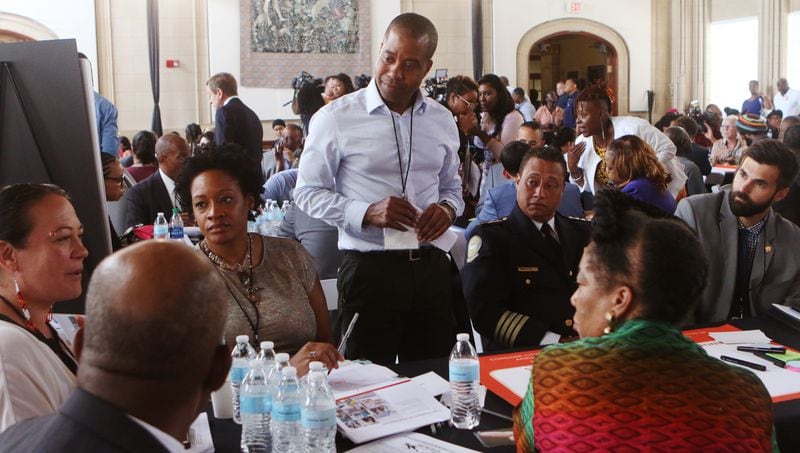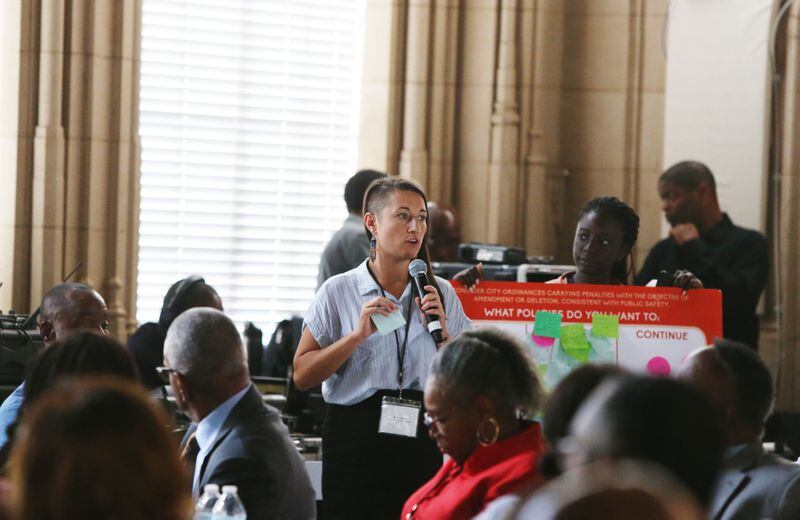A health and wellness center, a job training center, or a mental health facility are just a few new uses being considered for the Atlanta City Detention Center.
A task force of city leaders and community members met for the first time Tuesday to begin their work finding the best use for the Atlanta city jail building once it is closed and no longer accepting prisoners. And they have a tight deadline: Recommendations must be delivered to Mayor Keisha Lance Bottoms by February 2020.
Closing the jail will be the latest measure the city has taken in criminal justice reform.
The city is working with the non-profit consulting firm Bloomberg Associates and Oakland-based real estate agency Designing Justice + Designing Space, which is working on two other jail repurposing projects.
The 25-member group was chosen earlier this month after the City Council approved the task force to find a new use for the Atlanta City Detention Center in May. Three people were earlier designated to co-chair the task force: Rashad Taylor, advisor to Mayor Bottoms; Bill McGahan, founder of the organization, Georgia Works; and Marilynn Winn, executive director of Women on the Rise.
Bottoms was not present at Tuesday’s meeting but said in a video message that the city’s efforts have garnered national attention.
“This is a groundbreaking assignment and I feel confident that this diverse collection of leaders will enable us to find a positive and creative path forward as we reimagine this facility for the benefit of the community and our entire city,” she said.
Rapper T.I. is the most known of the appointees to the committee, but he was a no-show at the first meeting.
Credit: Christina R. Matacotta
Credit: Christina R. Matacotta
RELATED COVERAGE:
The first meeting of the task force included an introduction to the condition of the jail building and the building’s structure. Until task force members can settle on a new use for the jail, the potential costs to renovate it and what new use would best serve residents is still to be determined.
The city has studied four similar jail repurposing projects, including two in New York, with the help of Bloomberg Associates. In New York, two projects are underway to transform a former women’s prison into a space that houses organizations that advocate for women’s rights. Another project will transform a former youth detention center into a mixed-use development.
Those projects cost $250 million and $300 million, respectively and are expected to be completed by 2024.
Councilman Antonio Brown, who sits on the task force, said he thinks it’s important the task force be inclusive but also mindful of financially supporting the jail’s transition.
“We can come up with great ideas, but if we don’t have the financial backing, then it’s back to the drawing board,” he said.
Credit: Christina R. Matacotta
Credit: Christina R. Matacotta
Brown, who represents District 3 communities English Avenue and Vine City, said many of his residents would like to see the jail become a facility for mental health services as well as work placement services for the entire community.
Task members were divided into three subgroups during the meeting to discuss suggestions for transforming the building, creating programs viable for residents, and rewriting or eliminating ordinances and determining how much it will cost to overhaul the jail.
The decision to repurpose the jail comes as Fulton County officials are working to relieve crowding in the county jail. The county already has an agreement with Gwinnett County to accept some inmates, but more help is needed, Fulton officials say.
County leaders said Atlanta’s city jail closing has contributed to an increase in county inmates. Statistics from the Fulton sheriff’s office show Atlanta inmates make up about a third of the jail population.
The city jail has 1,314 beds and held 86 detainees as of 11 p.m. on Monday.
By comparison, Fulton County has 3,048 beds at each of its facilities combined, spokeswoman Tracy Flanagan said. Its largest facility on Rice Street is designed to hold 2,591 inmates, but as of Monday night, 2707 inmates were there with 283 of them sleeping in boats – “a thick plastic frame with a mattress that is placed on the floor,” she said.
The city has operated a detention center since the 1950s. In 1995, the city opened the existing location — a $56 million facility. The jail’s population has steadily declined but it still had 360 employees and an operating budget of $33 million in the fiscal year 2018.
Former mayoral candidate Mary Norwood, who opposed the idea of closing the city jail, said she supports the vision of repurposing the jail, but still thinks the jail should remain open in order to help relieve Fulton County Jail’s overcrowding.
“I love the goal of taking what’s happening in the facility and changing the lives of people who experience it,” she said, “But I would love to see that done in buildings that we already have.”
Staff writer Arielle Kass contributed to this report
In other news:








